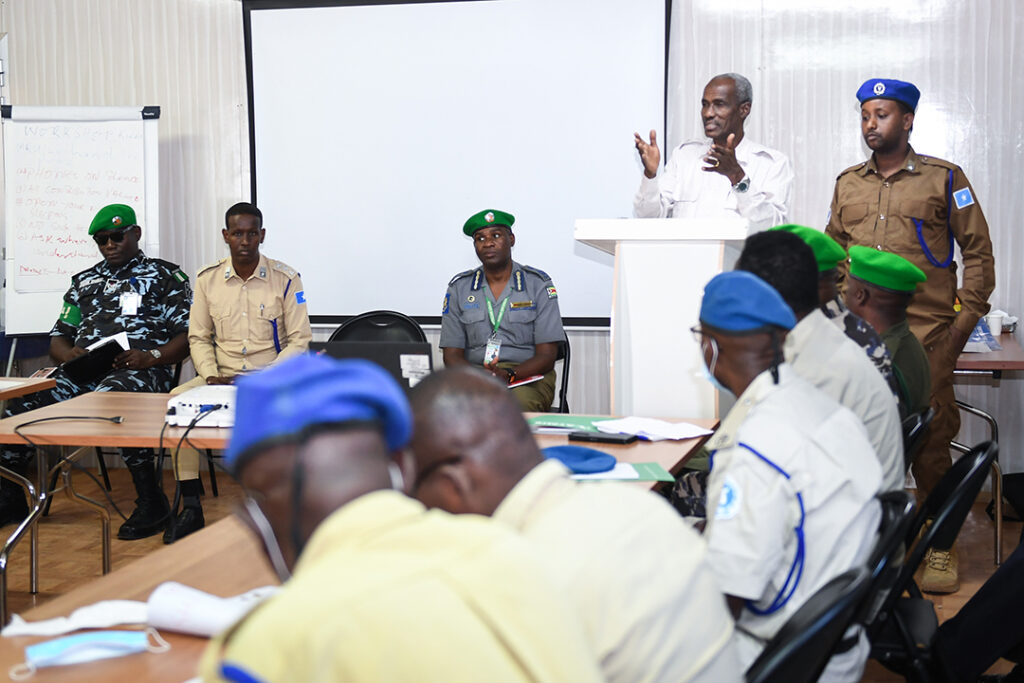ADF STAFF
Nearly 40 Somali Police Force (SPF) officers finished a week of training in community policing that officials hope will help turn the tide against the al-Shabaab insurgency.
Conducted by the Police Component of the African Union Transition Mission in Somalia (ATMIS), the training was attended by 17 station commanders and six representatives from the Community Policing Directorate. The training included courses on conflict resolution, professional standards, ethics, countering violent extremism, community engagement and gender issues. It ended February 7.
“The community policing training is key in enhancing the capacity of the SPF to take over the country’s security responsibilities when ATMIS forces exit at the end of their mandate,” ATMIS Chief Superintendent of Police Sao Vandy said in a new release.
ATMIS consists of 22,000 troops from Burundi, Djibouti, Ethiopia, Kenya and Uganda. The mandate is due to end in December 2024.
Brig. Gen. Yusuf Mohamed Farah, SPF director of community policing, said community policing training is key to establishing peace in the country. In 2021, nearly half of all worldwide terrorism-related deaths were reported in Somalia, Burkina Faso, Mali and Niger.
“This training is essential in fostering a good working relationship with the communities we serve,” Farah said in the release.
Other recent SPF training efforts included a weeklong ATMIS-conducted course on the management of police assets. Ten officers from the Department of Logistics completed it in September.
The next month, 150 SPF police officers completed three months of basic recruit training in Jubaland State. ATMIS also conducted that training.
Jubaland Vice President Mohamud Sayid Adan stressed the importance of police work during a graduation ceremony.
“As newly recruited police personnel, I urge you to stand for the protection of the community,” Adan said in a report by Somali newspaper Horn Observer. “Policing is a difficult job and you must be patient and alert to the prevailing threats and maintain peace and stability.”
In its efforts to steel its military forces in the war with al-Shabaab, Somalia’s government recently sent military recruits to Egypt, Eritrea, Ethiopia and Uganda for intensive training.
“We want to complete making 15,000 Soldiers ready within 2023,” Hussein Sheikh-Ali, national security advisor for Somali President Hassan Sheikh Mohamud, told Voice of America (VOA).
The government also has frozen funds and closed hundreds of bank accounts suspected of having links to al-Shabaab.
Despite the government’s security-strengthening efforts, a new report by Mogadishu-based think tank Heritage Institute for Political Studies (HIPS) indicated that it might not meet its goal to have 24,000 Soldiers ready by December 2024.
“The deadline and the fact the army is in a war while at the same time they are being rebuilt … we argue it’s a tight deadline,” Afyare Elmi, executive director of HIPS, told VOA. “It will be difficult to meet.”
But Ali, the national security advisor, remains optimistic and predicted that the country soon will be rid of al-Shabaab.
“Our primary goal is that in the summer of 2024, before June or July, that there will be no al-Shabab person occupying a territory in Somalia,” Ali told VOA. “You can note that down.”
Omar Mohamed Abu Ayan, a former al-Shabab official who left the group, said its fighters are withdrawing from areas as government forces and local militias approach, but they are not going far.
“They are not defending the towns, which they used to do,” Ayan told VOA. “Instead of moving further away, they are hovering around in the forests nearby the towns, and then they send suicide bombers back into the town.”

